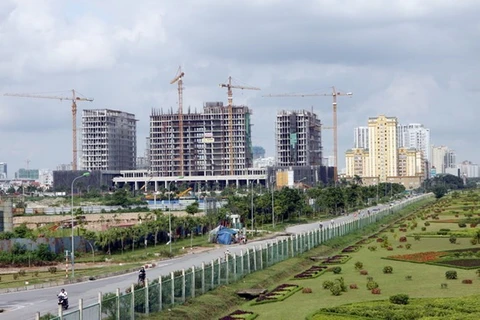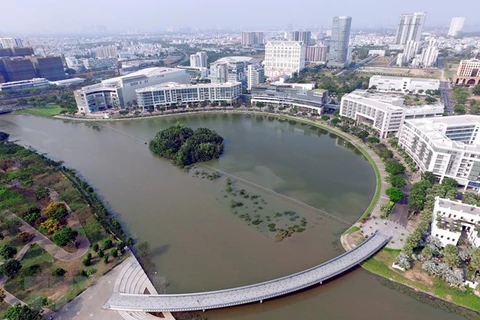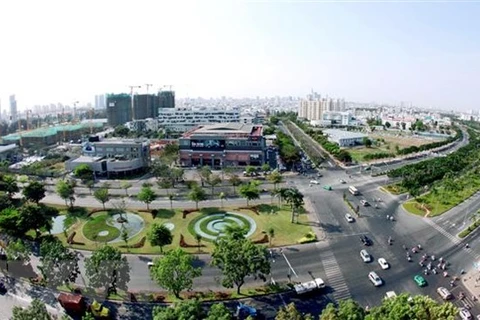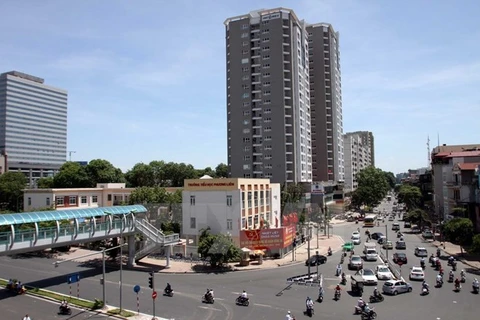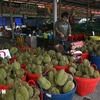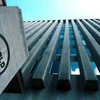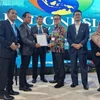Hanoi (VNA) – Foreign investors cannot take their eyes off the Vietnamese real estate market, one of the most dynamic emerging markets globally, according to an article by regional managing director, Southeast Asia, CBRE Vikram Kohli on www.bussinesstimes.com.sg.
“Driving its strong economic growth is an expanding middle class with thickening wallets,” the article said, adding that rapid urbanisation is supported by a young, growing and educated population, and all bode well for an economy with one of the world’s fastest growing gross domestic product (GDP) rate.
In addition, the World Bank has projected that Vietnam’s GDP will expand by 6.8 percent this year, fuelling big appetites of global investors looking to make their mark in Vietnam’s burgeoning property market. In the past three years, Vietnam has seen a significant increase in the number of foreign investments in the real estate sector. Developers from Singapore, Japan and the Republic of Korea have favoured sites in downtown areas while local developers usually enter into joint venture agreements with foreign developers on the premise of optimising decision-making in site sourcing and project management.
Since 2015, the bulk of big-ticket mergers and acquisition (M&A) transactions have been championed by those investing in property development sites, followed by hotels, apartments and offices. This is testament to the fact that those pouring money into Vietnam are in it for the long run.
Running alongside the strong demand for commercial sites is the relative shortage of supply, which is especially prevalent in the market for prime retail and office spaces in Ho Chi Minh City and Hanoi. Grade A rents in Ho Chi Minh City have surged from some 35 USD per square metre per month in Quarter 2 of 2016 to 43 USD per square metre per month in Quarter 2 of 2018, or a healthy 23 percent growth.
Rental growth has been observed in Hanoi over the past two years. In the office market, an increasing presence of international firms has resulted in developing areas absorbing the overflow of occupants. But progress in office construction has been pleasing, and the second half of 2018 will bring a significant amount of Grade A office supply onto the market.
According to the article, another area generating solid demand is the residential sector, and this segment of the market stands to inject further momentum in the economy - to illustrate, the largest initial public offering (IPO) this year was that of a luxury residential developer in which Singapore's sovereign wealth fund GIC recently acquired a stake.
Investors from Singapore, Hong Kong and Taiwan of China have shown much enthusiasm in the serviced apartment and condominium markets, together representing 75 percent of total buyers in the buy-to-let market.
As a whole, foreign buyers accounted for 50 percent of all successful residential deals, meaning they are not only entering Vietnam to set up operations, but are also committed to keeping their money here. This could explain the 15 percent rise in prime residential prices in Ho Chi Minh City over the past two years.
Thanks to governmental efforts to ease restrictions on foreign holding of public companies, the future just got brighter. This allows the composition of the economic landscape to diversify and encourages foreign ownership of commercial assets.
The article also highlighted a differentiating factor that Vietnam boasts is the relatively equal dispersion of wealth as compared to other developing nations. Meanwhile, the Government has laid stress on the need to improve productivity and lower transaction and logistics costs, which mean foreigners are receiving favourable conditions to land investment in the country.
Furthermore, escalating trade tensions between the US and China have prompted companies to shift production to Southeast Asia in a bid to circumvent levies.
Vietnam, which is a major exporter of apparel and electronics, has benefited from this shift of low-cost manufacturing away from China. In addition, as the 2015 real estate market recovery shows, the occasional market correction is good news in the long run.
The largest transactions this year - for major office, residential and retail sites, are all backed by foreign capital, gauging the fervor that foreign investors have in Asia's rising star.-VNA
VNA


